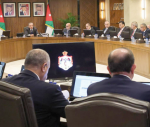You are here
Israel’s backhanded ‘apology’ for the Rafah Bombing
Jun 10,2024 - Last updated at Jun 10,2024
On May 27, Israel “apologised” for the 45 Palestinian deaths resulting from its bombing raid on a “humanitarian zone” in Rafah. This backhanded apology conveyed more insult than atonement. As Israeli apologies, even insincere ones, are rare, it’s worth examining this one’s background.
The bombing occurred just two days after the International Court of Justice ordered Israel to stop its assault on Rafah, citing the dangers to civilian life and humanitarian aid delivery. The International Criminal Court prosecutor had also just declared his intent to request arrest warrants for Israeli prime minister Benjamin Netanyahu and defense minister Yossi Gallant on charges of war crimes committed during the assault on Gaza.
Compounding Israeli embarrassment were the decisions by Spain, Ireland and Norway to recognise the State of Palestine and supportive statements for the ICC warrant request from France and Germany. Many European countries also issued swift and firm denunciations of the Rafah attack.
Unsurprisingly, the initial Israeli response was immediate and excessive. The ICJ was called “a moral outrage”. Israeli commentators denounced the court in racist terms, noting the percentage of judges from Muslim-majority or “third world” countries. The EU countries recognising Palestine were compared to Nazis and their action termed antisemitic. The greatest torrent of abusive language came in response to the ICC request for warrants. Justice Minister Levin referred to the request as “one of the biggest moral disgraces in human history”. Netanyahu narcissistically said the charges against him were “directed against all of Israel” and “an example of the new antisemitism”. He further deflected saying: “With what chutzpah do you dare compare Hamas…and the soldiers of the IDF who are fighting a just war that is unparalleled with a morality that is unmatched?” Netanyahu’s foes Benny Gantz and Yair Lapid called the request “a crime of historic proportions” and “unforgivable”.
This bullying through excessive language is Israel’s traditional response to criticism, an attempt to verbally pummel critics into submission while shoring up supporters.
Then came the decision to bomb Rafah, perhaps Israel demonstrating that they were undeterred by criticism. After, Israel described the attack as using “precise munitions based on precise intelligence”. Appearing aware of the attack’s possible repercussions, Israelis seemed to test their critics’ tolerance, threading the needle of compliance with international law and bowing to US concerns about civilian casualties.
Of course, the initial bombing was not precise, with 22 deaths reported. The fires ignited by the blast ravaged an adjacent area, burning to death 45 Palestinians.
Confronted by growing international outrage, the Israelis followed their normal practice of “deny, lie, and obfuscate”. They claimed that the death toll was exaggerated and the attack precise; then said the site wasn’t in a “protected zone”, a false claim, as a few days prior they’d expanded the zone to include the area they bombed. Then they denounced Hamas targets for “hiding out” among civilians. Adding an element of confusion, they suggested that the fire might have started if the bomb blast ignited a nearby Hamas arms cache. No evidence was presented (or needed) because with that obfuscation Israel felt it had cast doubt on its responsibility, shifting the blame back to Hamas.
Failing to dampen international rage, the Israelis made a rare choice: “apologise.” They could see world opinion turning against them. Despite the Biden administration’s hesitation to condemn their crossing his ever-moving red line, they know how precarious their position is in the US. With Netanyahu hoping to address Congress and facing Democratic boycott of his remarks, action was needed.
Hence, the decision to apologise, and what a backhanded apology it was. Netanyahu announced: “Despite our efforts not to hit them, there was a tragic mishap. We are investigating the incident.” Adding insult to injury, he continued, “For us it’s a tragedy; for Hamas it’s a strategy,” echoing the hurtful, racist comment of former prime minister Golda Meir: “We can forgive the Arabs for killing our children. We can never forgive them for making us kill their children.”
The apology’s insincerity was demonstrated a few days later when Israel bombed another Rafah refugee encampment, killing 21 Palestinians.
As if to greenlight more such attacks, despite growing worldwide and domestic condemnation of these mass killings, the Biden administration announced it would not take any action against Israel. They are satisfied with Israel’s precautions to avoid civilian deaths and its investigation of their actions in Rafah. Netanyahu plays to an audience of one so that’s enough for the bombings to continue.
The writer is president of the Washington-based Arab American Institute












Add new comment